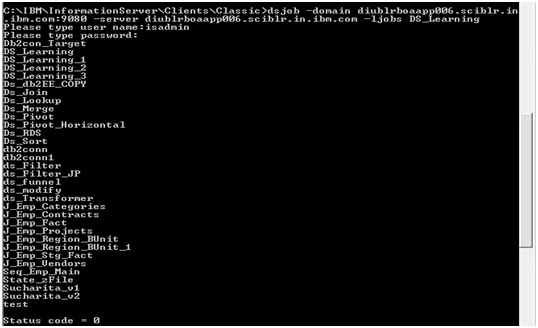Execute Command In Datastage
- Execute Command Activity In Datastage
- Execute Command In Datastage Training
- Execute Command 1.13
- How To Use Execute Command
- Return Value In Execute Command In Datastage
- I am trying to compile the datastage jobs using the Execute Command stage in datastage 11 or any Routines if possible. My datastage is on Unix machine. So, How can I Compile a datastage job in UNIX from command line or any Routines. Please help me in doing so.
- Execute Unix commands in datastage Goto page 1, 2 Next - Jump to Page View next topic View previous topic Add To Favorites. Hi Ray, Can you please tell me the solution. A very complete solution. Please purchase a premium memberhip that will allow you to read it, or have your employer purchase it.
- From the DataStage Administrator, go to the Projects page, select the project whose file you want to clear and click the Command button. The Command Interface dialog box opens. Type the following into the command field: CLEAR.FILE &PH& (all uppercase) Click Execute to run the command and clear the file.
I am trying to compile the datastage jobs using the Execute Command stage in datastage 11 or any Routines if possible. My datastage is on Unix machine.
Use a Sequence job to process a list of files. Posted on February 15, 2016 by Phil It is quite a common requirement to apply an action to a group of files, for example reading a group of input files, deleting some temporary files, archiving files etc.
I tried the following links to go, but I don't know how to do it.https://www-01.ibm.com/support/docview.wss?uid=swg21595194
So, How can I Compile a datastage job in UNIX from command line or any Routines.
Please help me in doing so.
Thank you.
2 Answers
It is not possible to compile DataStage jobs in Unix OS.
DataStage jobs can only be compiled from the client machine (which is on Windows). You can do this thru DatasTage Designer Client or by using commandline thru 'dscc' command.
Tennis elbow symptom. Nov 21, 2018 Tennis Elbow is a realistic and fun-to-play tennis aimed especially at Tennis fans and enthusiasts. The game includes realistic game-play, a powerful Artificial Intelligence engine, a wide range of realistic shots and ball trajectories, and much more. Created by tennis fans, which are regular ranked players, Tennis Elbow 2009 is a great tennis game for your PC, featuring both fun and realistic gameplay.With its ultra-realistic ball trajectories, an artificial intelligence that accurately replicates players' behavior, and a complete range of strikes and game situations, Tennis Elbow 2009 is the only game reproducing the impressions and the. Tennis Elbow 2009 is an incredibly realistic (and addictive) tennis game. It takes a while to get the hang of things, but once you do, you'll find it hard to stop playing.
Link which you have shared for dsjob command is for running/resetting jobs.
Why you are trying to compile a job ? In case of an abort you are trying to compile here you can reset it,
You can reset your job through UNIX server using below command :${DSHome}/dsjob -run -mode RESET -wait -jobstatus ${ProjectName} ${JobName}
Hope it will be helpful!
Not the answer you're looking for? Browse other questions tagged datastageinformation-server or ask your own question.

I am considering using RCP to run a generic datastage job, but the initial SQL changes each time it's called. Is there a process in which I can use a User Activity Variable to inject SQL from a text file or something so I can use the same datastage?
I know this Routine can read a file to look up parameters:
But does that mean I just store the SQL in one Single line, even if it's long? Thanks.
arcee123arcee123Execute Command Activity In Datastage
3 Answers
Why not just have the SQL within the routine itself and propagate parameters?
I have multiple queries within a single routine that does just that (one for source and one for AfterSQL statement)
Execute Command In Datastage Training
This is an example and apologies I'm answering this on my mobile!
I've used the multiple encapsulations in the example above, when passing out to a parameter make sure you check the ', ' have either been escaped or are displaying correctly
Again, apologies for the quality but I hope it gives you some ideas!
Execute Command 1.13
You can give this a try
As you mentioned ,maintain the SQL in a file ( again , if the SQL keeps changing , you need to build a logic to automate populating the new SQL)
In the Datastage Sequencer , use a Execute Command Activity to open the SQL file eg : cat /home/bk/query.sql
In the job activity which calls your generic job . you should map the command output of your EC activity to a job parameter
so if EC activity name is exec_query , then the job parameter will be
When you run the sequence , your query will flow from
SQL file --> EC activity-->Parameter in Job activity-->DB stage( query parameterised)
How To Use Execute Command
Has you thinked to invoke a shellscript who connect to database and execute the SQL script from the sequential job? You could use sqlplus to connect in the shellscript and read the file with the SQL and use it. To execute the shellscript from the sequential job use a ExecCommand Stage (sh, ./, ..), it depends from the interpreter.
Return Value In Execute Command In Datastage
Other way to solve this, depends of the modification degree of your SQL; you could invoke a routine base who handle the parameters and invokes your parallel job.
The principal problem that I think you could have, is the limit of the long of the variable where you could store the parameter.
Tell me what option you choose and I could help you more.
Angel DozaAngel Doza